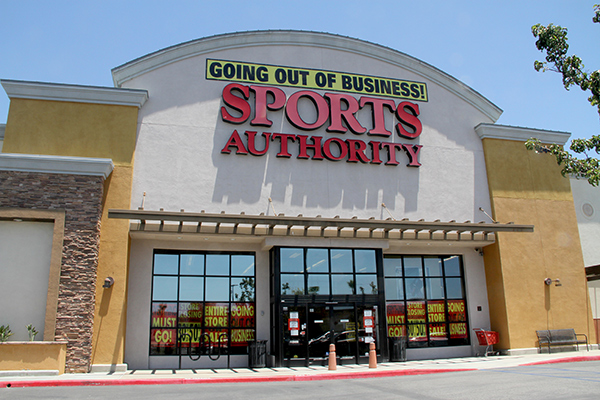While things worked out for vendors who did not file a UCC-1 in the Sports Authority Chapter 11, you may not be so lucky.

By: Kenneth A. Rosen, Esq.*
Never assume that it is not necessary to properly perfect a consignment arrangement by filing a UCC-1. Never assume that it is generally known that your customer sells consigned goods. Below is the story of vendors who were lucky and were able to retain their superior position as consignors. Not everyone will be so lucky. It is also a story about a retailer that did not recognize the leverage of key vendors.
When Sports Authority, the sporting goods retailer, commenced a Chapter 11 case on March 12, 2016, it had on hand 8.5 million units of consigned goods at a cost of $84.8 million. In fiscal 2015, the debtor had sales of consigned goods of $244 million. On the petition date, approximately 11%-12% of Sports Authority’s total inventory was subject to various consignment arrangements. The consigned goods consisted of activewear, recreational gear, golf gear, apparel, and footwear. Promptly after filing its bankruptcy petition, the debtor sought to close 200 of 463 stores and to find a buyer for the chain.
Sports Authority was hurt by big intrusions on its territory by retailers such as Target, Kohl’s, Athleta, and Walmart. Sports Authority filed for bankruptcy after it missed a $20 million payment to bondholders.
In its initial pleadings filed with the bankruptcy court, the debtor acknowledged that some consignment vendors may have security interests or liens on the consigned goods. But it also said that some consignment vendors did not have valid consignments. Some consignment vendors had not filed a UCC-1 notice pursuant to the Uniform Commercial Code to perfect their consignments.
Sports Authority sought to conduct a going out of business sale and to sell the consigned goods “free and clear.” It characterized unperfected consignment vendors as general unsecured creditors.
In a consignment arrangement, a seller of goods (the consignor) delivers goods to a middleman (the consignee), which retains possession of the goods until they are sold to a buyer or used by the consignee. Once the goods are sold to a buyer (typically the customer of the retailer) or used by the consignee in its manufacturing process, the sale proceeds are supposed to be remitted to the consignor. The consignor retains title to the consigned goods until they are sold or used. A creditor that fails to satisfy the UCC’s requirements for consignment risks having its claim subordinated to secured and priority claims.
A consignor uses the same UCC financing statement form that a secured creditor uses in perfecting a security interest in personal property collateral. A consignor has priority over a creditor with a prior “blanket” security interest in the consignee’s inventory if the consignor satisfies all of the requirements for a valid purchase money security interest. The UCC’s filing requirements are designed to protect creditors from “hidden liens” or “secret liens” of unperfected consignors. An unperfected consignment is nothing more than a sale on credit.
Shortly after commencing its Chapter 11 case, Sports Authority filed lawsuits to contest the validity of consignment arrangements with vendors that (it asserted) failed to properly perfect their consignment arrangements. The debtor wanted to sell the goods as part of its liquidation sale or going out of business sale.
At this point, several critical vendors refused to do business with the debtor – which made a going concern sale of the business impossible. Bankruptcy Code Section 366 requires a utility (such as a gas or electricity supplier) to continue servicing a Chapter 11 debtor. But that provision generally cannot be used to compel a vendor such as Nike, New Balance, or Adidas to continue supplying product to the debtor. And it is impossible to be in the retail athletic footwear business without carrying certain key brands. Lesson No. 1 for a consignee: If a consignee picks a fight with a key vendor over whether the vendor’s consignment arrangement is valid, it risks being unable to purchase goods from the vendor, and the vendor cannot be compelled to let the consignee buy the goods. In turn, this can make a reorganization or going concern sale of the business impossible.
The bankruptcy court held that the consignors’ interest in their consigned goods was superior to the blanket security interest held by the bank lenders despite the consignors’ failure to perfect their consignment interest under UCC Article 9. The court relied on UCC § 9-102(a)(20), which says that a consignment is not subject to Article 9’s priority rules if a consignor can prove that the consignee’s creditors generally knew that the consignee was substantially engaged in selling consigned goods.
The court opined that the UCC’s filing requirements are designed to protect creditors from hidden or secret liens of unperfected consignors – which did not exist if the consignee was known generally to sell consigned goods.
Although the consignors were successful in defending their consignment in the Sports Authority case, vendors should not take much comfort in the court’s decision. Whether a retailer is generally known by its creditors to be a seller of consigned goods can be a very subjective test. It is much more prudent to always file a UCC-1 form.
What to do: Conduct a lien search on the consignee to confirm whether any third parties have a conflicting security interest in the consigned goods. File a separate UCC-1 financing statement naming the consignor as the secured party. Do not assume that your customer’s other creditors know that the customer generally sells consigned goods.

Kenneth A. Rosen is a partner and Chair Emeritus in the Bankruptcy & Restructuring Department of Lowenstein Sandler LLP. Ken has more than 35 years of experience advising on the full spectrum of restructuring solutions, including Chapter 11 reorganizations, out-of-court workouts and financial restructurings.
Scott Ellyson, CEO of East West Manufacturing, brings decades of global manufacturing and supply chain leadership to the conversation. In this episode, he shares practical insights on scaling operations, navigating complexity, and building resilient manufacturing networks in an increasingly connected world.